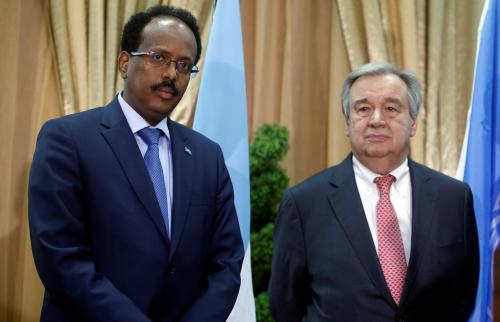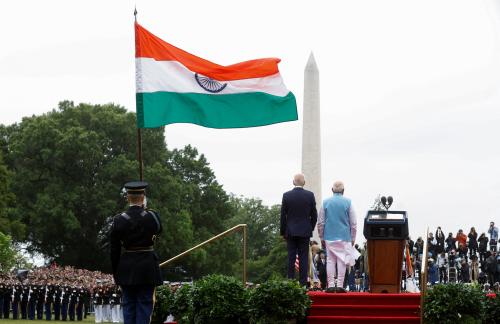Developments in US-Africa relations
On Monday evening, the U.S. Senate passed the African Growth and Opportunity Act and Millennium Challenge Act Modernization Act (AGOA and MCA Modernization Act, HR 3445). The legislation aims to increase transparency and effectiveness of programs under the African Growth and Opportunity Act and the Millennium Challenge Act. Notably, it calls for the U.S. Department of State to promote the use of AGOA privileges and access by eligible sub-Saharan African countries though trade capacity building and technical assistance efforts. It also enables the Millennium Challenge Corporation (MCC) to engage in regional compacts and cross-border investments in MCC eligible countries.
On Tuesday, President Trump signed a proclamation lifting the travel ban on the Central African country of Chad. Chad nationals will once again be eligible to receive visas to travel to the U.S., as of Friday, April 13. In September 2017, the Trump administration placed Chad under restrictions for its failure to comply with baseline U.S. national security requirements, including U.S. homeland security officials’ requests for samples of the most recent version of their passports and information on public safety and terrorism-related data. The administration’s decision to lift the travel restrictions was based on improvements in the country’s identity management and information sharing systems during a 180-day review period, the White House stated.
The Wall Street Journal reported this week that U.S. special-operations forces in Africa are increasingly working from remote command centers, withdrawing their presence from the front lines of missions. Still, the U.S. military is actively engaged in combatting threats in the Sahel region: On Wednesday, the U.S. special operations command in Africa launched its annual 10-day counterterrorism exercise in Niamey, Niger. The training brings together nearly 2,000 service members from 20 African and Western countries to strengthen the military capabilities of West African countries to counter threats from terrorist groups in the region.
In other news, five U.S. senators returned this week from a week-long trip to Burkina Faso, Niger, South Africa, and Zimbabwe, where they met with leaders from government, business, military, and civil society to reinforce the U.S.-Africa partnership amid a dearth of diplomatic personnel on the continent. In a press release following the trip, Senator Chris Coons (D-Del.), a member of the Senate Foreign Relations Committee, said, “The clearest lesson from this trip was a simple one: We need more American engagement in Africa, not less, and I will continue pushing the Trump administration to deepen and strengthen ties across the continent.”
Rising concerns over Zambia’s foreign debt
On Monday, April 9, yields on Zambia’s eurobond debt jumped from 0.5 percent to 8.5 percent on concerns of large undisclosed foreign debts. These recent debt concerns come amid a backdrop of rising debt levels in Zambia and ongoing negotiations with the International Monetary Fund over a US$1.3 billion loan to increase foreign exchange reserves. Zambia’s external debt increased from $2 billion in 2011 to almost $9 billion in 2018, and the country will spend 27 percent of its revenues this year to repay debt.
The 8.5 percent yield on Zambia’s 2027 eurobonds is the highest in a year and has risen sharply since early December when it was below 7 percent. According to Peter Attard Montalto, head of emerging Europe, Middle East and Africa economics unit at Nomura Holdings, “the hidden-loan problem, in our view, is likely one of short-term external debt that is at least as big as known external loans and external bonds combined.” The Zambian Finance Ministry has strongly pushed back against any suggestions of debt under-reporting, asking market participants to “produce empirical evidence.”
In recent weeks, Zambian authorities also imposed a $7.9 billion tax bill—which includes import duties, penalties and interest—on First Quantum Minerals, a major copper producer in the country, and announced a plan to audit other mining companies’ operations for the past six years.
Nissan and GE further enter East African markets
This week, Nissan Motor Co. Ltd., the Japan-based car company, announced that it plans to start assembling vehicles in Kenya in addition to its current plants in South Africa and Nigeria. The company is starting slow, though: It plans to start its venture by putting together one-ton pick-up trucks from semi-knocked-down kits—basically half-finished vehicles. These cars already make up about 12 percent of all new purchases in Kenya in 2017. Nissan will also start work at an established plant, than building a completely new one. If the government agrees to the proposal and waives the 25 percent import tax, the company intends to have an operational assembly line by the end of 2019. Nissan is not the only automaker looking to Kenya as an East Africa hub: Volkswagen AG, PSA Peugeot, and CNH Industrial NV also plan to start assembling vehicles in the country.
Also this week, Uganda announced that it would be awarding the contract for building its first oil refinery to the Albertine Graben Refinery Commission, which is made up of General Electric, Yaatra Ventures LLC, Intracontinent Asset Holdings Ltd. and Italy’s Saipem SpA. The refinery, which will be built in Hoima, is expected to cost between $3 billion and $4 billion. The process so far has met several obstacles, as GE and its partners are actually the third entity to be awarded the contract: Russia’s RT Global Resources in 2015 followed by South Korea’s SK Engineering & Construction Co. in 2016 had their contracts rescinded. Uganda intends to have the refinery up and running by 2020 and ultimately be able to process 60,000 barrels per day. The Albertine Graben region, where oil was found in 2006, is estimated to have about 6.5 billion barrels of oil.







Commentary
Africa in the news: US-Africa relations, Zambian debt, and East African business deals
April 13, 2018